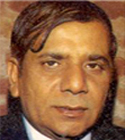Celebrities »
Singer »
Masood Rana
|







Singer Attaullah Khan Essa Khailwi
Attaullah Khan Niazi Esakhelvi is a Paki Singer Momina Mustehsan Momina Mustehsan is Pakistani singer and Singer Hassan Jahangir Hassan Jahangir is a Pakistani Pop singe Singer Zoe Viccaji Zoe Viccaji is the Pakistani singer, son Singer Mustafa Zahid Mustafa Zahid is the well known Pakistan Singer Ali Asad Zaidi Ali Asad Zaidi is Pakistani singer, who Singer Shafqat Amanat Ali Shafqat Amanat Ali is Pakistani classica Singer Asif Hussain Samraat Asif Hussain Samrat is the leading Pakis Singer Nouman Javaid Nouman Javaid is 33 years old Pakistani Singer Rahim Shah Rahim Shah (Urdu: Pashto: رح Advertisement |



LiveTV.pk
Bookmark Live Tv
Share & Win